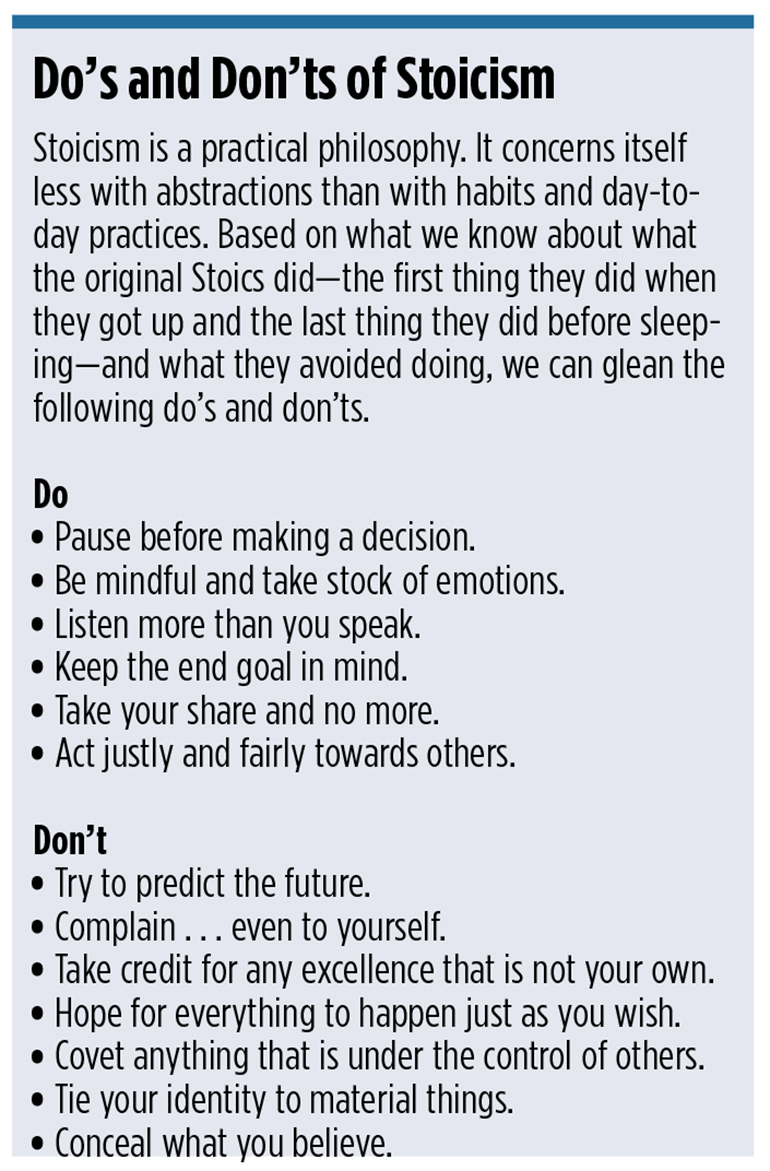The ancient Greek philosophy of Stoicism is having somewhat of a moment as markets reel from the volatility and uncertainties of the current pandemic.
Stoicism insists that there is a separation between the way the world happens to be and our emotional response to it. From that flows the main wisdom: to separate the few things that are up to us—our judgments, emotions and character—from the many things that are not up to us—almost everything we call market forces.
WealthManagement.com had no difficulty finding four financial advisors who freely channel Stoic principles in their professional and personal lives to share their perspectives.
“Market downturns are inevitable,” says Arvind Ven, CEO and founder of Capital V Group, an independent advisory in Cupertino, Calif. “Nobody has a crystal ball. We can’t control what happens. What we can control are our reactions.”

“Nobody has a crystal ball. We can’t control what happens. What we can control are our reactions.”
Stoicism requires that financial advisors accept that they cannot control most of what happens and that it’s fruitless to worry about external events. Rather, Stoics focus all their energy and intelligence on things they can control.
The wisdom of Stoicism is to control emotions both when it’s punishing favored positions as well as when the market rewards. Equanimity under both conditions allows advisors to make rational decisions about what to do and when.
Domesticating Emotions
The word stoic has come to be associated with a suppression of emotion, an attitude that regards life as a series of trials to be silently endured. The reality is that Stoics experience all the emotions of anyone else. It’s simply about domesticating these emotions.
Pamela Sams, a financial advisor with Jackson Sams Wealth Strategies in Herndon, Va., integrates Stoicism with behavioral finance to help her mostly female clients see and perceive the world around them. Sams frames her perspective in three disciplines rooted in Stoicism: Discipline of Perception (how clients see and perceive the world around them); Discipline of Action (the effective action they take in response); and Discipline of Will (how clients deal with the things they cannot change). “There’s no reason to get frazzled about things you can’t control,” Sams notes.
When the market turns against her, Sams has taught her clients how to take a freeze moment. “Whatever you are doing, take a moment to pause, digest what’s going on—emotionally and physiologically—take stock and then decide how to react.”
“Stoic practice helps me model a relaxed attitude,” Sams says, adding that if the advisor is tense and worried, clients tend to be tense and worried, too. “My philosophy is that financial planning is life planning with money attached to it.”

“My philosophy is that financial planning is life planning with money attached to it.”
How Does Stoicism Work?
Stoicism as an agent of wealth management embraces four core practices:
 Focus on What Is Up to You—Stoics impose a two-way test for effective action. First, that the action be within the advisor’s control. Second, that the action actually matters. Action that is not within the advisor’s control (e.g., timing the market) is unsustainable. Action that doesn’t matter (e.g., switching custodians) may feel good but only by chance has a positive effect on the client’s well-being.
Focus on What Is Up to You—Stoics impose a two-way test for effective action. First, that the action be within the advisor’s control. Second, that the action actually matters. Action that is not within the advisor’s control (e.g., timing the market) is unsustainable. Action that doesn’t matter (e.g., switching custodians) may feel good but only by chance has a positive effect on the client’s well-being.
Delay Gratification—Stoics encourage the forgoing of present consumption in the service of future benefit. While it’s true we cannot control the future, we can control our preparation for uncertainty. Most advisors already practice this tenet by encouraging clients to create estate plans, buy insurance, leverage tax-free accounts and save for education needs.
Control Emotions—This is, by far, the hardest practice demanded by Stoicism. Research has shown that emotionally driven investment decisions are the number one reason why financial plans underperform. The field of behavioral finance maps the myriad ways our emotions undermine investment objectives. Stoicism counsels prudent, long-term investing that tames emotional responses.
Express Gratitude for Everything that Happens—Stoics go beyond being grateful just for the good things. How much richer would our lives be, Stoics ask, if we could sincerely be grateful for everything life offers, including the market downturns and other disagreeable events that beset humans? What happened, good or bad, is a sunk cost.
Housebreaking the Reptilian Brain

"It’s important for one to check the emotions at the door when thinking about the appropriate reaction to certain circumstances, especially in terms of investment markets.”
“Levelheadedness” may be a good one-word description of the main benefit that Stoicism offers financial advisors, according to Dennis Doble, co-founder at Doble LeBranti Financial Group in Burlington, Mass. Framing events from a long-term perspective is another key.
Doble educates clients that financial performance suffers when emotions are allowed to control investment decisions. Stoic practice extends this principle to every aspect of life. “Lack of emotion or immediate reaction does not equal lack of caring,” Doble says. “It’s quite the opposite. It’s important for one to check the emotions at the door when thinking about the appropriate reaction to certain circumstances, especially in terms of investment markets.”
Stoicism is the housebreaking of the reptilian brain, the part of humans that makes impulses irresistible. Advisors who regulate their emotions using Stoic principles still feel every emotion that humans experience. It’s impossible not to. What Stoics work toward is not to be ruled by those feelings.
“Although the Stoics came up with this philosophy over two millennia ago, human nature remains exactly the same,” says Kenneth Korngold, international director at Intercontinental Wealth Advisors in San Antonio, Texas. “Today, these teachings and meditations provide important insights into behavioral finance that reveal that there is really nothing new under the sun. Investors often fixate on the relentless ascent of an asset or become agitated at the prospect of a major market downturn.”
The Stoic philosophers believed external events were beyond our control and that we should accept whatever happens calmly and dispassionately in the present moment. “By embracing clarity in the moment, we can radically alter the way we address our clients’ hopes, fears, and aspirations and our approach to investing,” Korngold says.





